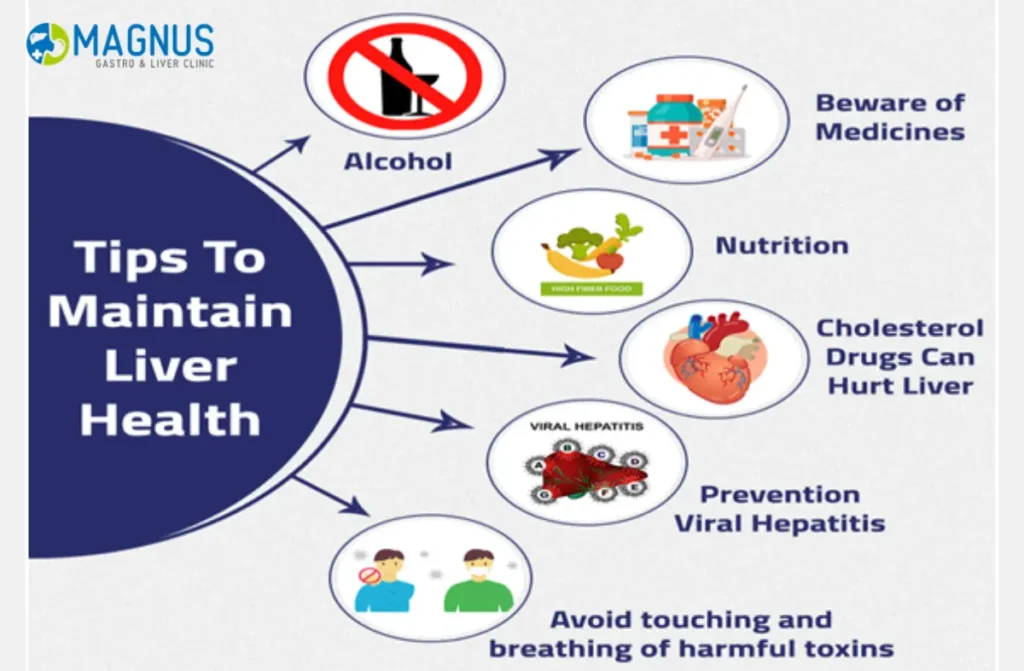Liver health is crucial for overall well-being, as it plays a key role in detoxifying the body, digesting food, and producing essential proteins. But how to keep your liver healthy? With rising liver disease rates, this is a common concern. We’ll share practical tips—from diet to lifestyle—that show how to maintain liver health, improve it naturally, and answer your questions about how to keep your liver healthy naturally and how to make your liver healthier through simple daily habits.
8 Ways to a Healthy Liver
- Maintain a Healthy Weight: Excess body fat, especially around the abdomen, increases the risk of fatty liver. Losing 5–10% of your body weight can reduce liver fat and improve overall liver function. It’s one of the most effective ways on how to keep your liver healthy naturally.
- Eat a Balanced Diet: A nutrient-rich diet full of vegetables, fruits, lean protein, and healthy fats helps reduce liver stress. How to make your liver healthier Avoid trans fats, refined carbs, and high-fructose foods.
- Stay Hydrated: Drinking enough water supports the liver’s natural detoxification processes. It also helps flush out waste and maintain healthy digestion, which plays a major role in how to keep your liver healthy and functioning optimally.
- Exercise Regularly: Physical activity improves insulin sensitivity and reduces fat buildup in the liver. Aim for at least 150 minutes of moderate exercise per week to keep the liver active and healthy. It’s a crucial part of how to keep your liver healthy naturally.
- Limit Alcohol Consumption: Alcohol is a major cause of liver inflammation and damage. If you drink, do so in moderation—or avoid it altogether if you already have liver issues. Reducing alcohol is a direct step in how to make your liver healthier.
- Limit Processed Foods: Packaged foods high in sugar, salt, and unhealthy fats contribute to fatty liver and poor metabolic health. Choose whole, minimally processed foods instead. This dietary shift is important for anyone learning how to keep your liver healthy in the long term.
- Choose Natural Remedies Wisely: Milk thistle, turmeric, and dandelion root are known to support liver health. These herbs help reduce inflammation and support liver cell repair—making them powerful options for those seeking how to keep your liver healthy naturally.
- Avoid Smoking: Smoking introduces toxins that increase liver stress and raise the risk of liver diseases, including cancer. Quitting is one of the best decisions you can make when focusing on how to make your liver healthier and protecting it from long-term harm.
What conditions and disorders affect the liver?
- Fatty Liver Disease (NAFLD / MAFLD): Caused by fat buildup in the liver, often due to obesity or insulin resistance. It can lead to inflammation and cirrhosis if untreated. Eating well and exercising are key to managing it.
- Alcoholic Liver Disease (ALD): Excessive alcohol damages liver cells, leading to fatty liver, hepatitis, or cirrhosis. Quitting alcohol is essential for recovery and long-term how to keep your liver healthy naturally.
- Hepatitis B and C: Viral infections that cause liver inflammation and long-term damage. Preventing infection through vaccination and safe practices is crucial.
- Cirrhosis: Severe liver scarring from chronic liver diseases. It affects liver function and may cause complications like portal hypertension or liver failure.
- Liver Cancer: Often linked to cirrhosis or chronic hepatitis. Regular monitoring is vital for early detection, especially in high-risk groups.

What are the symptoms of liver problems?
- Jaundice (Yellow Skin/Eyes): A clear sign of liver trouble, jaundice occurs when bilirubin builds up in the blood. It usually indicates moderate to severe liver dysfunction. Understanding this symptom is essential when asking how can I keep a healthy liver and avoid complications.
- Fatigue and Weakness: Constant tiredness may result from the liver’s reduced ability to process nutrients and remove toxins. It often appears early in liver disease.
- Swelling in Legs or Abdomen: Fluid retention (edema) and abdominal bloating (ascites) are signs of poor liver circulation and declining function.
- Confusion or Trouble Concentrating: A failing liver can’t filter toxins properly, leading to brain fog or disorientation—known as hepatic encephalopathy in advanced cases.
- Nausea or Loss of Appetite: Digestive discomfort, a lack of hunger, or unexplained weight loss may point to liver inflammation or liver-related digestive issues.
When should I seek medical attention?
You should seek medical attention if you notice yellowing of the skin or eyes (jaundice), unexplained fatigue, or swelling in the abdomen or legs. Sudden weight loss, appetite changes, dark urine, pale stools, or easy bruising may also indicate liver dysfunction. Mental confusion or forgetfulness could signal toxin buildup from poor liver function. Recognizing these warning signs early is essential for taking action on how to make your liver healthier through timely care and proper lifestyle changes.
Common Liver Diseases
- Hepatitis (A, B, C, D, and E): Viral infections of the liver cause inflammation, and some, like Hepatitis B and C, can progress to cirrhosis or cancer if untreated. Vaccinations, safe hygiene practices, and early detection help reduce risks. Understanding these conditions is essential in learning how can I keep a healthy liver effectively.
- Fatty Liver Disease: Caused by excess fat buildup, fatty liver is linked to obesity, diabetes, and alcohol consumption. If untreated, it may lead to non-alcoholic steatohepatitis (NASH) and eventually cirrhosis. Lifestyle adjustments such as exercise and diet changes are crucial in how to keep your liver healthy long term.
- Cirrhosis: Chronic liver damage from alcohol misuse, viral hepatitis, or fatty liver results in scarring that impairs function. This condition shows why it is important to know how to keep your liver clean and healthy by preventing long-term damage.
- Liver Cancer: Often developing from cirrhosis or hepatitis, hepatocellular carcinoma is the most common type. Regular screenings for high-risk patients improve outcomes. Preventive care, early diagnosis, and protective habits show how to keep your liver strong and healthy and lower complications.
Why Liver Function is Important
- Detoxification of the Body: The liver acts as the body’s natural filter, removing toxins, alcohol, and medication byproducts from the bloodstream. If this process weakens, harmful substances accumulate, causing fatigue, confusion, or organ failure. This shows how can I keep a healthy liver should be a top health priority.
- Metabolism and Energy Balance: The liver processes fats, proteins, and carbohydrates, converting them into energy. A poorly functioning liver disrupts metabolism, leading to weakness or weight changes. Regular exercise, proper nutrition, and hydration are key in how to keep your liver healthy for sustained energy.
- Blood Clotting and Immunity: The liver produces proteins that regulate blood clotting and plays a vital role in supporting the immune system. When damaged, bleeding risks increase, and infections become harder to fight. Protective habits highlight how to keep your liver clean and healthy through preventive care.
- Storage and Nutrient Regulation: Vitamins and minerals like iron and B12 are stored in the liver for long-term use. If function declines, nutrient absorption falls, leading to deficiencies. Balanced eating and hydration demonstrate how to keep your liver strong and healthy and ensure how to keep your liver healthy while on medication.
Can Supplements Help?
- Milk Thistle for Liver Support: Milk thistle is one of the most widely used supplements for liver health due to its antioxidant properties. It may protect liver cells from damage caused by toxins and alcohol. However, it should complement—not replace—medical treatment. Knowing how can I keep a healthy liver includes using such aids wisely.
- Turmeric and Curcumin Benefits: These compounds possess strong anti-inflammatory effects that may reduce liver inflammation. While useful, excessive consumption can burden the liver instead of protecting it. Moderation in use is an important aspect of how to keep your liver healthy safely.
- Vitamin E and Non-Alcoholic Fatty Liver Disease: Vitamin E has been studied for reducing inflammation in fatty liver disease. Yet, high doses can increase cardiovascular risks, making medical supervision essential. This guidance helps answer how to keep your liver clean and healthy without added health complications.
- Safe Use with Medications: People often ask how to keep your liver healthy while on medication. Supplements may help, but interactions with prescriptions can cause harm. Consulting healthcare providers ensures safety. A thoughtful approach with balanced nutrition and supplements also supports how to keep your liver strong and healthy effectively.
Follow Your Treatment Plan if You Have Liver Disease
- Medication Compliance: Taking prescribed medications consistently is vital for liver recovery. Skipping or altering doses can worsen the condition and increase risks. Patients often ask how to keep your liver healthy while on medication, and the most effective answer is to follow medical instructions exactly as directed.
- Lifestyle Adjustments: Diet, exercise, and alcohol avoidance play a major role in managing liver disease. Eating nutrient-rich meals, maintaining hydration, and staying active are part of how can I keep a healthy liver. These adjustments slow disease progression and promote long-term wellness.
- Regular Medical Monitoring: Routine check-ups, blood tests, and imaging help doctors assess treatment progress and detect complications early. Monitoring ensures patients learn how to keep your liver clean and healthy by staying proactive and aware of their condition.
- Holistic and Supportive Care: Emotional well-being, stress management, and physical activity are essential parts of recovery. Practices like yoga, meditation, and light exercise demonstrate how to keep your liver strong and healthy. Following medical advice and lifestyle strategies also reinforces how to keep your liver healthy while on medication, ensuring safer long-term outcomes.
Conclusion
Maintaining liver health is essential for overall well-being, and with a few simple changes, you can keep your liver in top shape. From staying hydrated to avoiding excessive alcohol and toxic substances, there are many ways to prevent liver damage. A healthy diet, regular exercise, and avoiding harmful medications are all key components of how to keep your liver healthy. If you want to know how to keep your liver healthy naturally, take small steps every day to support your liver’s function. Regular check-ups, being mindful of your lifestyle, and consulting with healthcare professionals can also ensure you maintain a healthy liver throughout your life.




